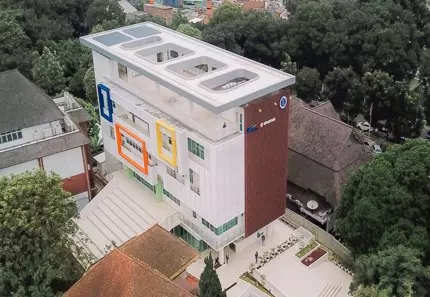Program Studi Pendidikan Bahasa Inggris - S2
Lihat Data Dosen

Program Studi
- Tanggal SK: 27 September 2023
Kadaluarsa: 30 September 2027
Akreditasi: Unggul
Status: Aktif - Tanggal SK: 16 Oktober 2019
Kadaluarsa: 16 Oktober 2024
Akreditasi: A
Status: Tidak Aktif - Tanggal SK: 20 September 2014
Kadaluarsa: 19 September 2019
Akreditasi: B
Status: Tidak Aktif - Tanggal SK: 20 Februari 2009
Kadaluarsa: 20 Februari 2014
Akreditasi: B
Status: Tidak Aktif
(27-09-2023)
Pendidikan Bahasa Inggris - S2
Universitas Negeri Malang
(01-01-1976)
(22-03-2011)
Kota Malang
Prov. Jawa Timur

Tentang Pendidikan Bahasa Inggris S2 - Universitas Negeri Malang
The Master's Program in English Language Education (ELE) has been contributing to the development of English Language Education and scholarship in Indonesia for some forty years. In this sense, it has been contributing to the development of ELE globally through both activities such as seminar and other academic and professional forums.
Along the dynamics in the Department which was established in 1954, the Master's program has undergone several changes, both in terms of the curriculum and its identity. In 1968, the Institute for Teacher Training and Education, Malang (at present Universitas Negeri Malang) initiated higher education for Doktorandus to obtain a doctoral degree through the Doctoral Program (Strata 3 or Ph.D.). The establishment of a graduate program in the form of the Doctoral Program was based on the regulation of the Minister of Higher Education and Science no. 19, dated July 20, 1962.
In 1980, the graduate program was split into Doctoral Degree (S3 or Ph.D.) Programs and Masters Degree (S2 or M.A.) Programs. Accordingly, Universitas Negeri Malang started to offer Masters Degree Programs in Education (1980), pursuant to the Presidential Decree of the Republic of Indonesia No.60/1982, dated September 7, 1982 and the Doctoral Study Programs were officially converted to the Masters and Doctoral Programs (PDP). One year later, with the Decree of the Ministry of Education and Culture No. 0146/0/1983, dated March 5, 1983, the PDP was changed to the Graduate Faculty. Subsequently, with the Government Regulation N0. 30, 1990, the Graduate Faculty was further restructured from Faculty to Program, with the new name of Graduate Program.
Taking into account recent trends and policies, the curriculum of Master's in ELE is developed in view of the capability of the graduates in the gamut of ELE and the research capability within the discipline and the ensuing ability to disseminate and communicate their capability to the relevant discourse community and community in general.
Visi Program Studi
The Masters Program in English Language Education (ELE) becomes an excellent program providing knowledge-based English Language Education at the Masters level which supports the attainment of high stature of Universitas Negeri Malang in 2030.
Misi Program Studi
The Masters Program in ELE upholds and translates, in view of local, national, and international collaborative works, the Threefold Missions of Higher Education (Tri Dharma Perguruan Tinggi) encompassing education, research and community services by:
1) Carrying out quality student-centered Masters education in the field of ELE;
2) Conducting research to strengthen the knowledge and profession of ELE, and
3) Providing services in the field of ELE for the empowerment of the community.
Kompetensi Dasar Program Studi
Pursuant to the Indonesian Qualification Framework (Kerangka Kurikulum Nasional Indonesia) and verse 5 of Permendikbud No. 3, 2020, three points of Learning Outcomes of the Masters Program in English Language Education are formulated as follows:
1. Mastery of the theories of ELE
2. Capability to carry out quality research in the gamut of ELE in the view of national publishability and contributions to the society,
3. Capability to communicate thoughts and research results to the wider community both through academic fora (oral and written) and community services.


